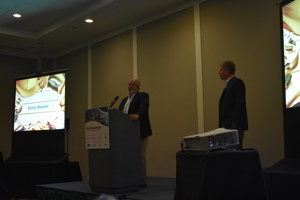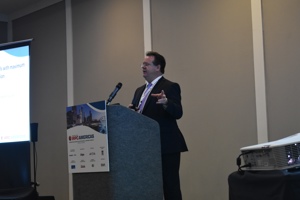IRPC '19: Gearing up for the future
HOUSTON—Day 2 of Hydrocarbon Processing's International Refining and Petrochemical Conference (IRPC)—Americas opened with keynotes from Keith Couch, Senior Director, Technology Sales and Integrated Projects for Honeywell UOP; and Stephen Mulva, Director, Construction Industry Institute (CII), The University of Texas at Austin and Stephen Cabano, President, Pathfinder LLC and Chair, Construction Industry Institute.
Refinery of the Future: Crude-to-chemicals with maximum bottom of the barrel conversion
Mr. Couch's presentation discussed refining and petrochemicals integration, noting how firms around the world approach creating more value out of every barrel of crude and how refining and petrochemicals organizations can make their refinery future-forward. According to Mr. Couch, Petrochemicals integration is becoming the standard upon which all integrated industrial complexes are being built. "We do see a future where some refineries produce only petrochemicals," Couch said. The refinery of the future, according to Couch, has three main characteristics; it is flexible and able to meet rapidly changing product markets at a lower cost with minimum residual products. It is integrated with petrochemicals to achieve higher margins and value with molecule management to produce fuels or base petrochemicals. And it is connected, achieving best operating performance every day with real-time business advisers and an engaged/skilled and enabled workforce.
Tools to transform the capital projects industry

Developments in technology within the industry are making an impact on capital projects, but the pace of change within the industry has been relatively slow and from a financial perspective, certain types of capital projects are not as successful. Mr. Mulva and Mr. Cabano's presentation noted that the current industry status is not conducive to lowering costs substantially and that is largely because of the sheer volume of contractors involved in a project and other points of transactional waste. Mulva and Cabano noted that a new business model that allows the industry's best efforts to thrive is needed. Mr. Mulva introduced the OS2 initiative, which is a new business and commercial model for the capital projects industry. OS2 according to Mulva and Cabano, is a solution that aims to create a standardized platform to enhance the health and stability of the industry by making future capital projects more financially viable. Cabano and Mulva concluded their presentation with a call to action to not be afraid of change and to be like Uber, VRBO and Tesla, who have revolutionized their industries.







Comments